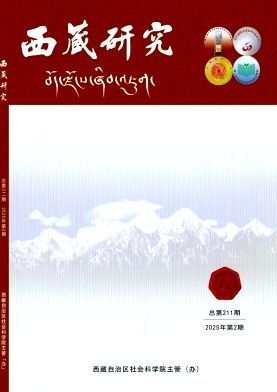| 680 | 9 | 11 |
| 下载次数 | 被引频次 | 阅读次数 |
在解释西藏传统社会中被广泛实践的一妻多夫制婚姻时,人们常常忽略了其产生的历史背景、社会结构、环境差异,以致无法真正理解其产生与存续的原理与发生机制。从伦理学的视角纠正原有的偏见与误解,研究发现:西藏一妻多夫制婚姻中的性关系将会严格遵循规则;刻意淡化父亲的生物性身份而强化社会性身份;这种婚姻具有被广泛接受的经济价值与伦理逻辑;妇女拥有较高家庭和社会地位,并在这种婚姻中扮演核心角色。不难发现,要从"人与自然的互动"和"人与宗教伦理的互动"中,"生存性智慧"的逻辑中,道德的普遍性与特殊性中才能全面理解传统西藏一妻多夫制婚姻伦理议题。
Abstract:It is a common fault that historical background,social structure and environmental discrepancies are ignored in the studies of polyandry. Therefore it is impossible to fully understand the principle and mechanism of its existence and survival. This paper attempts to correct the previous biases and misunderstandings about polyandry from the perspective of ethics. The study finds that strict rules must be followed in terms of sexual relations and the father's biological identity is deliberately weakened while his social identity strengthened in the Tibetan polyandry marriage. The study also reveals the economic value and ethical logic behind the marriage system's popularity as well as women,with higher family and social status,plays a central role in such a marriage. It can be concluded that in order to fully understand the ethical issues in polyandry in Tibet,it is essential to take the following into consideration: 1)interactions between humans and nature; 2) interactions between humans and religious ethics; 3) survival wisdom logic; and 4) the generality and specificity of morality.
[1]沈宗濂.西藏与西藏人[M].北京:中国藏学出版社,2006.
[2]Fjeld,Heidi and Theresia Hofer.Women and Gender in Tibetan Medicine[J].Asian Medicine,2011,6(2).
[3]宋希仁.家庭伦理新论[J].中国人民大学学报:社会科学版,1998(4).
[4]罗国杰.伦理学[M].修订本.北京:人民出版社,2014.
[5]马戎.试论藏族的“一妻多夫”婚姻[J].民族研究,2000(6).
[6]星全成.民主改革前藏族婚姻制度[J].青海民族研究,1997(1).
[7]吴从众.民主改革前西藏藏族的婚姻与家庭——兼论农奴制度下存在群婚残余的原因[J].民族研究,1981(4).
[8]坚赞才旦,许韶明.论青藏高原和南亚一妻多夫制的起源[J].中山大学学报:社会科学版,2006,46(1).
[9]欧潮泉.论藏族的一妻多夫[J].西藏研究,1985(2).
[10]Stephens M E.Half a Wife Is Better Than None:A Practical Approach to Nonadelphic Polyandry[J].Current Anthropology,1988,29(2).
[11]Berreman,Gerald D,Pahari Polyandry:A Comparison[J].American Anthropologist,1962,64(1).
[12]Thomas Aquinas.Summa Contra Gentiles(SCG),translated by V.J.Bourke and edited by J.Kenny[M].New York:Hanover House,1955.
[13]班觉.西藏妇女的婚姻地位探析[J].西藏研究,2012(6).
[14]Berreman,Gerald D.Are Human Rights Merely a Politicized Luxury in the World Today[J].Anthropology and Humanism Quarterly,1980,5(1).
[15]扎洛.卓仓藏人的骨系等级婚制及其渊源初探[J].民族研究,2002(4).
[16]Levine,Nancy E,Silk J B,“The Theory of RüKinship,Descent and Status in a Tibetan Society.”In Asian Highland Societies in Anthropological Perspective,edited by Christoph von Führer-Haimendorf[M].New Delhi:Sterling,1976.
[17]坚赞才旦,许韶明.青藏高原的婚姻和土地:引入兄弟共妻制的分析[M].广州:中山大学出版社,2013.
[18]班觉.太阳下的日子:西藏农区典型婚姻的人类学研究[M].北京:中国藏学出版社,2012.
[19]Stoltz,Jonathan.The ethics(and economics)of Tibetan polyandry[J].Journal of Buddhist Ethics,2014,21.
[20]Goldstein M C.Pahari and Tibetan polyandry revisited[J].Ethnology,1978,17(3).
[21]Levine,Nancy E.Fathers and Sons:Kinship Value and Validation in Tibetan Polyandry[J].Man,1987,22(2).
[22]Cabezón,JoséI.Homosexuality and Buddhism.In Homosexuality and World Religions,edited by Arlene Swidler,Valley Forge[M].PA:Trinity Press International,1993.
[23][德]黑格尔.法哲学原理[M].北京:商务印书馆,1961.
[24]李有义.李有义与藏学研究——李有义教授九十诞辰纪念文集[M].北京:中国藏学出版社,2003.
[25]李安宅.李安宅藏学文论选[M].北京:中国藏学出版社,1992.
[26]次仁央宗.西藏贵族世家(1900-1951)[M].北京:中国藏学出版社,2005.
[27]石硕.如何认识藏族及其文化[EB/OL].2016-04-19/2016-7-27[2017-02-25].http://www.zangx.com/cms/news/guonei/2016-04-19/781.html.
[28]Childs G.Polyandry and population growth in a historical Tibetan society[J].The History of the Family,2003,8(3).
[29]Stewart,Elbert W,Evolving life styles;an introduction to cultural anthropology[M].New York:Mc Graw Hill,1973.
[30]Goldstein,Melvyn C,Fraternal polyandry and fertility in a high Himalayan valley in Northwest Nepal[J].Human Ecology,1976,4(3).
[31]张耕华,李永圻.吕思勉先生年谱长编[M].上海:上海古籍出版社,2012.
[32]范琦.伦理学[M].台北:台湾商务印书馆,1956.
[33]方克立.费孝通与“和而不同”文化观[J].中国社会科学院研究生院学报,2006(6).
基本信息:
DOI:
中图分类号:C913.1
引用信息:
[1]杨成洲,杨帆.反思与超越:传统西藏一妻多夫制婚姻中的伦理议题探究[J].西藏研究,2017,No.164(04):90-96.
基金信息:
国家社会科学基金青年项目“西藏人口转变研究”(项目编号:15CRK023); 中央高校基本科研业务费专项资金资助重点研究基地“人口与可持续发展研究中心”项目(项目编号:JBK150402)阶段性成果
